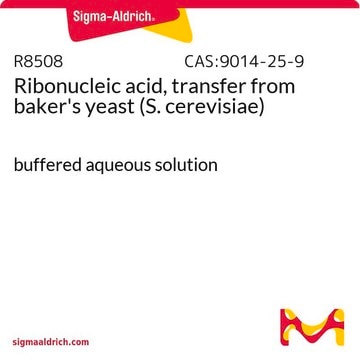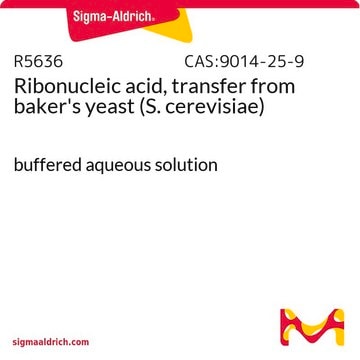R4752
Ribonucleic acid, transfer from bovine liver
Type XI, lyophilized powder
Synonym(s):
Transfer RNA, tRNA
Sign Into View Organizational & Contract Pricing
All Photos(1)
About This Item
Recommended Products
Looking for similar products? Visit Product Comparison Guide
Related Categories
General description
Transfer ribonucleic acid (tRNA) is a non-coding RNA. It is approximately 70-100 base pair long. It has a cloverleaf shaped secondary structure. It has three or four arms and a stem structure. It has minor bases like pseudouridine, dihydrouridine and methylated bases in its structure. It has a binding site for triplet nucleotide sequence and for amino acids.
Application
Ribonucleic acid, transfer from bovine liver has been used:
- to analyze the efficiency of thioflavin T (ThT) as a fluorophore
- to test its ability to inhibit the growth of endothelial cells
- as a component in translation mixture
- as a non-specific competitor RNA for protein purification studies using poly(A) tailed RNA affinity column
Ribonucleic acid, transfer from bovine liver may be used as a starting material for the purification of specific amino acyl-tRNA species by methods such as liquid column chromatography or high-performance liquid chromatography (HPLC).
Biochem/physiol Actions
Transfer ribonucleic acid (tRNA) plays a major role in translation, a key step in protein synthesis. It decodes mRNA into protein. There are about 40-60 different tRNAs in a eukaryotic cell and fewer in bacteria. This depends on the degeneracy of the amino acid code. Each amino acid has a specific tRNA. tRNAs are charged with specific amino acid and carries them to the site of protein synthesis. It binds to the ribosome and directs the amino acid to the growing polypeptide chain. It also functions as a regulator of various biological processes. Mutations associated with tRNA is implicated in human diseases.
Unit Definition
One unit will yield an A260 of 1.0 in 1.0 mL of water (1 cm light path).
Analysis Note
This product is evaluated for amino acceptor activity using aminoacyl-tRNA synthetase and L-arginine
Storage Class Code
11 - Combustible Solids
WGK
WGK 3
Flash Point(F)
Not applicable
Flash Point(C)
Not applicable
Personal Protective Equipment
dust mask type N95 (US), Eyeshields, Gloves
Certificates of Analysis (COA)
Search for Certificates of Analysis (COA) by entering the products Lot/Batch Number. Lot and Batch Numbers can be found on a product’s label following the words ‘Lot’ or ‘Batch’.
Already Own This Product?
Find documentation for the products that you have recently purchased in the Document Library.
New role for tRNA and its fragment purified from human urinary bladder carcinoma conditioned medium: inhibition of endothelial cell growth
Zhao H, et al.
Journal of Cellular Biochemistry, 76(1), 109-117 (2000)
RNA-Protein Interactions : A Practical Approach, 149-150 (1998)
From DNA to Protein: The Transfer of Genetic Information, 217-221 (1980)
Approaches for monitoring nuclear translation
mRNA Processing and Metabolism, 103-113 (2004)
Shujuan Xu et al.
Scientific reports, 6, 24793-24793 (2016-04-22)
RNA G-quadruplexes (G4s) play important roles in translational regulation, mRNA processing events and gene expression. Therefore, a fluorescent probe that is capable of efficiently recognizing RNA G-quadruplex structures among other RNA forms is highly desirable. In this study, a water-soluble
Our team of scientists has experience in all areas of research including Life Science, Material Science, Chemical Synthesis, Chromatography, Analytical and many others.
Contact Technical Service







